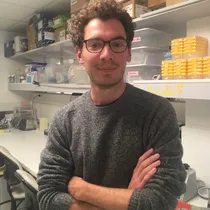- Accueil >
- Publications >
- Microbial metabolites control the thymic development of mucosal-associated invariant T cells
Microbial metabolites control the thymic development of mucosal-associated invariant T cells
Auteurs
François Legoux, Déborah Bellet, Celine Daviaud, Yara El Morr, Aurelie Darbois, Kristina Niort, Emanuele Procopio, Marion Salou, Jules Gilet, Bernhard Ryffel, Aurélie Balvay, Anne Foussier, Manal Sarkis, Ahmed El Marjou, Frederic Schmidt, Sylvie Rabot, Olivier Lantz
Résumé
Commensals rule the MAITrix
Mucosal-associated invariant T (MAIT) cells play an important role in mucosal homeostasis. MAIT cells recognize microbial small molecules presented by the major histocompatibility complex class Ib molecule MR1. MAIT cells are absent in germ-free mice, and the mechanisms by which microbiota control MAIT cell development are unknown (see the Perspective by Oh and Unutmaz). Legoux
Equipes






